Loka Li
MemR$^3$: Memory Retrieval via Reflective Reasoning for LLM Agents
Dec 23, 2025Abstract:Memory systems have been designed to leverage past experiences in Large Language Model (LLM) agents. However, many deployed memory systems primarily optimize compression and storage, with comparatively less emphasis on explicit, closed-loop control of memory retrieval. From this observation, we build memory retrieval as an autonomous, accurate, and compatible agent system, named MemR$^3$, which has two core mechanisms: 1) a router that selects among retrieve, reflect, and answer actions to optimize answer quality; 2) a global evidence-gap tracker that explicitly renders the answering process transparent and tracks the evidence collection process. This design departs from the standard retrieve-then-answer pipeline by introducing a closed-loop control mechanism that enables autonomous decision-making. Empirical results on the LoCoMo benchmark demonstrate that MemR$^3$ surpasses strong baselines on LLM-as-a-Judge score, and particularly, it improves existing retrievers across four categories with an overall improvement on RAG (+7.29%) and Zep (+1.94%) using GPT-4.1-mini backend, offering a plug-and-play controller for existing memory stores.
Reflection-Window Decoding: Text Generation with Selective Refinement
Feb 05, 2025



Abstract:The autoregressive decoding for text generation in large language models (LLMs), while widely used, is inherently suboptimal due to the lack of a built-in mechanism to perform refinement and/or correction of the generated content. In this paper, we consider optimality in terms of the joint probability over the generated response, when jointly considering all tokens at the same time. We theoretically characterize the potential deviation of the autoregressively generated response from its globally optimal counterpart that is of the same length. Our analysis suggests that we need to be cautious when noticeable uncertainty arises during text generation, which may signal the sub-optimality of the generation history. To address the pitfall of autoregressive decoding for text generation, we propose an approach that incorporates a sliding reflection window and a pausing criterion, such that refinement and generation can be carried out interchangeably as the decoding proceeds. Our selective refinement framework strikes a balance between efficiency and optimality, and our extensive experimental results demonstrate the effectiveness of our approach.
Causal Representation Learning from Multimodal Biological Observations
Nov 10, 2024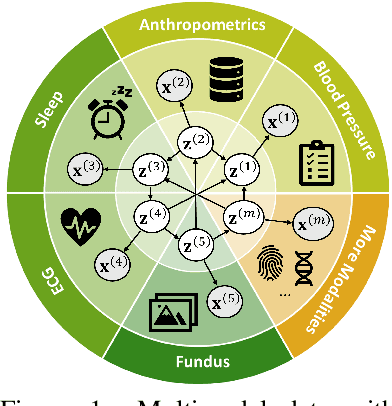

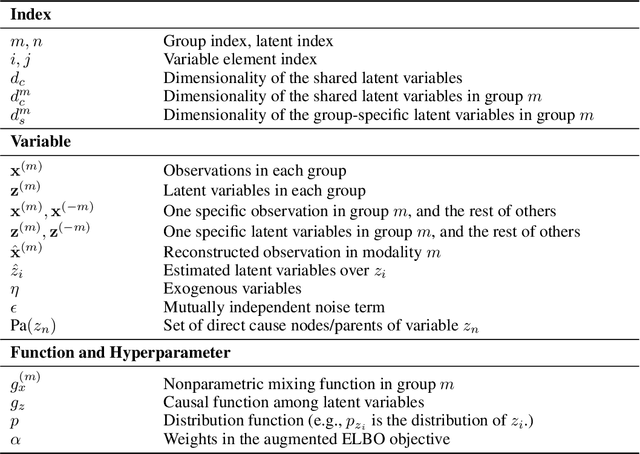
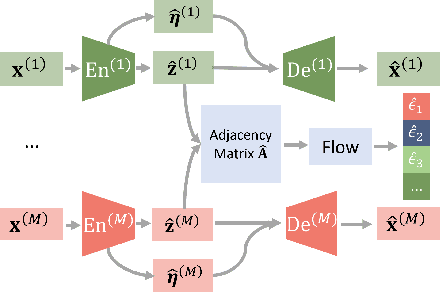
Abstract:Prevalent in biological applications (e.g., human phenotype measurements), multimodal datasets can provide valuable insights into the underlying biological mechanisms. However, current machine learning models designed to analyze such datasets still lack interpretability and theoretical guarantees, which are essential to biological applications. Recent advances in causal representation learning have shown promise in uncovering the interpretable latent causal variables with formal theoretical certificates. Unfortunately, existing works for multimodal distributions either rely on restrictive parametric assumptions or provide rather coarse identification results, limiting their applicability to biological research which favors a detailed understanding of the mechanisms. In this work, we aim to develop flexible identification conditions for multimodal data and principled methods to facilitate the understanding of biological datasets. Theoretically, we consider a flexible nonparametric latent distribution (c.f., parametric assumptions in prior work) permitting causal relationships across potentially different modalities. We establish identifiability guarantees for each latent component, extending the subspace identification results from prior work. Our key theoretical ingredient is the structural sparsity of the causal connections among distinct modalities, which, as we will discuss, is natural for a large collection of biological systems. Empirically, we propose a practical framework to instantiate our theoretical insights. We demonstrate the effectiveness of our approach through extensive experiments on both numerical and synthetic datasets. Results on a real-world human phenotype dataset are consistent with established medical research, validating our theoretical and methodological framework.
$ψ$DAG: Projected Stochastic Approximation Iteration for DAG Structure Learning
Oct 31, 2024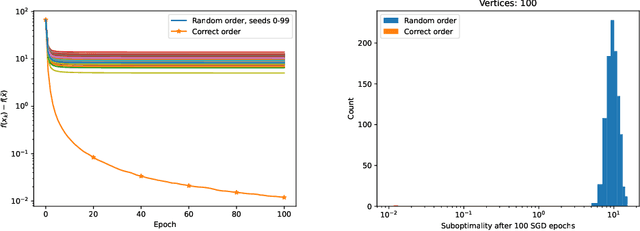

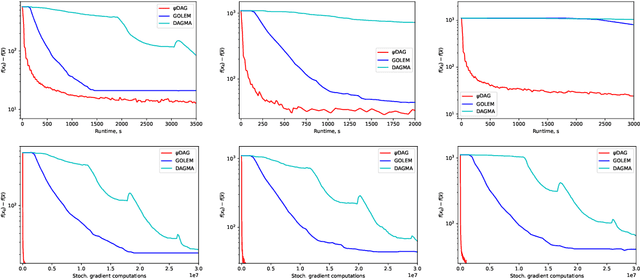
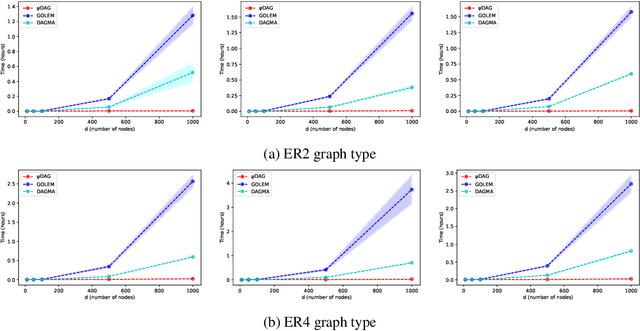
Abstract:Learning the structure of Directed Acyclic Graphs (DAGs) presents a significant challenge due to the vast combinatorial search space of possible graphs, which scales exponentially with the number of nodes. Recent advancements have redefined this problem as a continuous optimization task by incorporating differentiable acyclicity constraints. These methods commonly rely on algebraic characterizations of DAGs, such as matrix exponentials, to enable the use of gradient-based optimization techniques. Despite these innovations, existing methods often face optimization difficulties due to the highly non-convex nature of DAG constraints and the per-iteration computational complexity. In this work, we present a novel framework for learning DAGs, employing a Stochastic Approximation approach integrated with Stochastic Gradient Descent (SGD)-based optimization techniques. Our framework introduces new projection methods tailored to efficiently enforce DAG constraints, ensuring that the algorithm converges to a feasible local minimum. With its low iteration complexity, the proposed method is well-suited for handling large-scale problems with improved computational efficiency. We demonstrate the effectiveness and scalability of our framework through comprehensive experimental evaluations, which confirm its superior performance across various settings.
Confidence Matters: Revisiting Intrinsic Self-Correction Capabilities of Large Language Models
Feb 27, 2024Abstract:The recent success of Large Language Models (LLMs) has catalyzed an increasing interest in their self-correction capabilities. This paper presents a comprehensive investigation into the intrinsic self-correction of LLMs, attempting to address the ongoing debate about its feasibility. Our research has identified an important latent factor - the "confidence" of LLMs - during the self-correction process. Overlooking this factor may cause the models to over-criticize themselves, resulting in unreliable conclusions regarding the efficacy of self-correction. We have experimentally observed that LLMs possess the capability to understand the "confidence" in their own responses. It motivates us to develop an "If-or-Else" (IoE) prompting framework, designed to guide LLMs in assessing their own "confidence", facilitating intrinsic self-corrections. We conduct extensive experiments and demonstrate that our IoE-based Prompt can achieve a consistent improvement regarding the accuracy of self-corrected responses over the initial answers. Our study not only sheds light on the underlying factors affecting self-correction in LLMs, but also introduces a practical framework that utilizes the IoE prompting principle to efficiently improve self-correction capabilities with "confidence". The code is available at https://github.com/MBZUAI-CLeaR/IoE-Prompting.git.
Federated Causal Discovery from Heterogeneous Data
Feb 27, 2024



Abstract:Conventional causal discovery methods rely on centralized data, which is inconsistent with the decentralized nature of data in many real-world situations. This discrepancy has motivated the development of federated causal discovery (FCD) approaches. However, existing FCD methods may be limited by their potentially restrictive assumptions of identifiable functional causal models or homogeneous data distributions, narrowing their applicability in diverse scenarios. In this paper, we propose a novel FCD method attempting to accommodate arbitrary causal models and heterogeneous data. We first utilize a surrogate variable corresponding to the client index to account for the data heterogeneity across different clients. We then develop a federated conditional independence test (FCIT) for causal skeleton discovery and establish a federated independent change principle (FICP) to determine causal directions. These approaches involve constructing summary statistics as a proxy of the raw data to protect data privacy. Owing to the nonparametric properties, FCIT and FICP make no assumption about particular functional forms, thereby facilitating the handling of arbitrary causal models. We conduct extensive experiments on synthetic and real datasets to show the efficacy of our method. The code is available at https://github.com/lokali/FedCDH.git.
 Add to Chrome
Add to Chrome Add to Firefox
Add to Firefox Add to Edge
Add to Edge